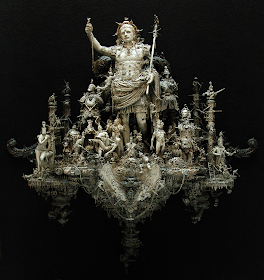It's reasonable to assume that magic varies from people to people and possibly even within any given culture there will be some variety. It's even safer to assume that players could use a hand in thinking widely on what kind of magic fellow they want to be.
It's very simple. Pick a philosophy and take their starting spell instead of Read Magic. They all work the same as each other, they just have different approaches and theories. I'll be expanding on this in the future, one is already planned for issue #3 of
The Undercroft.

Hedge witch - Unseen Servant
Talented men and women who choose to live lives of solitude on the outskirts of civilisation but not entirely apart from it. Their homesteads are visited regularly by young women seeking love potions, old men with unsightly sores, and small children who linger at the tree line and dare each other to peek in the filthy windows.
They possess a typical practitioners distance from the unenlightened but lack the drive and hunger for power of more the more classical paths to magic. Thus they live poorly on the kindness of woodsmen and farmers in the hopes they don't one day get dragged from their home and thrown in a river when one of them births a child that isn't quite right.
Nganga - Protection from Evil
A mediator between the material realm and that of the spirits and ancestors. A saviour of lives who plays an honourable role in the religious and social order. As a healer of the body the nganga works in close proximity to the spirits, bridging the world of the living and of the ancestors. Witch, priest, prophet, of all the users of magic they are the most integral to the people they come from.
To the nganga and their people, the living world is full of pain and stifling order while the ancestors exist in wild happiness. Through music, trance and divination they can touch this world to bring a measure of true magic to the body of the people.

Necromancer - Cure Light Wounds
Concerned with the power of life and death, their magic comes from that balance. Magic, to them, is the lifeforce which flows through everything, and the necromancer knows how to sense and direct its course. The flow is not as inexorable as some might think, the flow can be slowed or even stopped, it's powers used to turn the wheel of an infinite expanse of power.
Some cultures view their philosophies as offensive in the extreme, denying the dead their place in the afterlife. The necromancers would dispute this naive view of what "lifeforce" is, maybe explaining that one can drink from the river without diminishing it, that the water will return and flow through them. But it is hard to discuss magical theory while on fire.

Demonologist - Summon
Charismatic negotiators with excellent memories for the names and tittles of the denizens of the sub-realms. One of the most academic and arguably
scientific of the schools of thought, it is well researched and has a long pedigree of guided instruction from teacher to pupil.
Remorselessly practical, a demonologist requires an encyclopaedic knowledge of their craft lest it fly out of control and ends them. There is very little room for artistry for the demonologist as minor mistakes will ensure they do not live to spread their fruity thoughts.

Alchemist - Purify Food and Drink
Concerned with the refining of the soul into higher orders. Referring to their craft as magic might insult some of the more conservative of their society who would be quick to correct you. What they do is elevate matter, adjust the humours, and scale the pyramid of divinity.
True, they hold showy magics to be a crass misuse of their science, but this does necessarily mean that their research has not led them to theories that could melt your eyeballs out of their sockets.
Ultimately an alchemists aim is the refinement, spiritually and physically, of the base.

Mystic - Bless
The healers, the gurus, the dirty men that sit on poles and commune with the wind. There is no school to go to, few teachers willing or still possessing the mental faculties to teach. No, it is a personal path, a return to the roots of magic as learned by our ancestors.
They very rarely rise to any real power but it is common for one to stumble onto what was once forgotten knowledge now overlooked by more traditional and less laterally minded schools. They are often sought out for their very peculiar learnings.
Classically Trained Sorcerer - Read Magic
Tutored by an old master or hack conjurer. Regardless of quality or integrity they took you in and taught you how to let the spells sit comfortably in your head. Between cleaning floors and lancing boils you found time to read your masters books and get what knowledge they had to offer.
Thus is the story of the average classical sorcerer. They pass knowledge, part art part science, down through apprentices like any other craft (though one that finds few gifted in it).

Enchanter - Charm Person
They know that appearances are everything. Magic happens as a conversation between reality and our expectations of it and enchanters can guide the topic to areas that interest them.
They know that reality is an illusion created by the mind, that the "truth" of anything is subjective and subject to change.
They know that the mind is weak and malleable, yet theirs is strong.

Solipsist - Sleep
Your mind is the universe, nothing is not of you. Magic is just an expression of your desire, instances of your reaching out and swirling the waters. Anything is possible if you will it.































